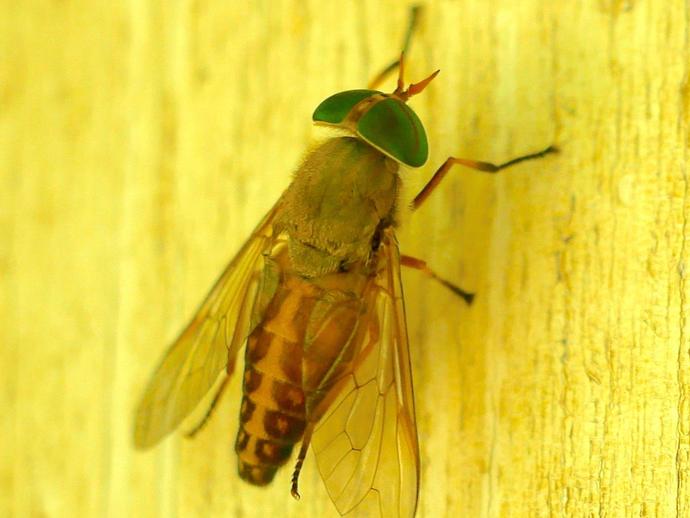July 4, 2020
Happy July 4th! There's a good chance that a lot of folks out there are going to spend today gathering with (a hopefully very small and safely-distanced group of) friends, grilling some delicious meats, shooting off fireworks, and maybe even taking a dip in a pool. And if you do that last one, you might encounter today's highlight, the horse-fly!
This particular horse-fly is Tabanus fulvulus. Horse-flies have been recognized in literature since the Ancient Greek playwright Aeschylus wrote that they drove people to madness. Mankind's opinion of the horse-fly has not much improved in the intervening 2,500-odd years.
Horse-flies are found all over the world, and some species are actually important pollinators. Both males and females feed on nectar. The females of most species of horse-fly, however, also feed on blood (the males don't). Most female horse-flies are anautogenous, which means that they need to consume blood in order for their eggs to mature.
If you've ever been bitten by a horsefly, you'll know that it's not like being bitten by a mosquito; it hurts! This is because horse-flies generally feed on large animals that have no ability to dislodge the fly, so they haven't needed to evolve the same painless approach that mosquitoes use. The mouthparts of female horse-flies have six stylets (cutting probes) that they use to make the initial cut, then they lap up the blood with a spongy labium -- sort of the fly equivalent of a lower lip.
You might notice that horse-flies seem to be a big nuisance at swimming pools. This is because they're attracted to the reflections of water. If you're having problems with horse-flies, try moving to a shady area. They're also inactive at night.
Tomorrow, we're going to look at another unusual fly that has a much better reputation. #BenInNature
This post brought to you by VMNH Corporate Supporter Bassett Furniture.
ABOUT THIS POST
Social distancing can be difficult, but it presents a great opportunity to become reacquainted with nature. While he is working from home, Administrator of Science Ben Williams is venturing outdoors each day to record a snapshot of the unique sights that can be found in the natural world.
NATURE PHOTO IDENTIFICATIONS
If you discover something in nature that you would like help identifying, be sure to message us right here on Facebook with a picture (please include location and date of picture) and we'll have our experts help you identify it!

 Hours & Admissions
Hours & Admissions Directions
Directions

